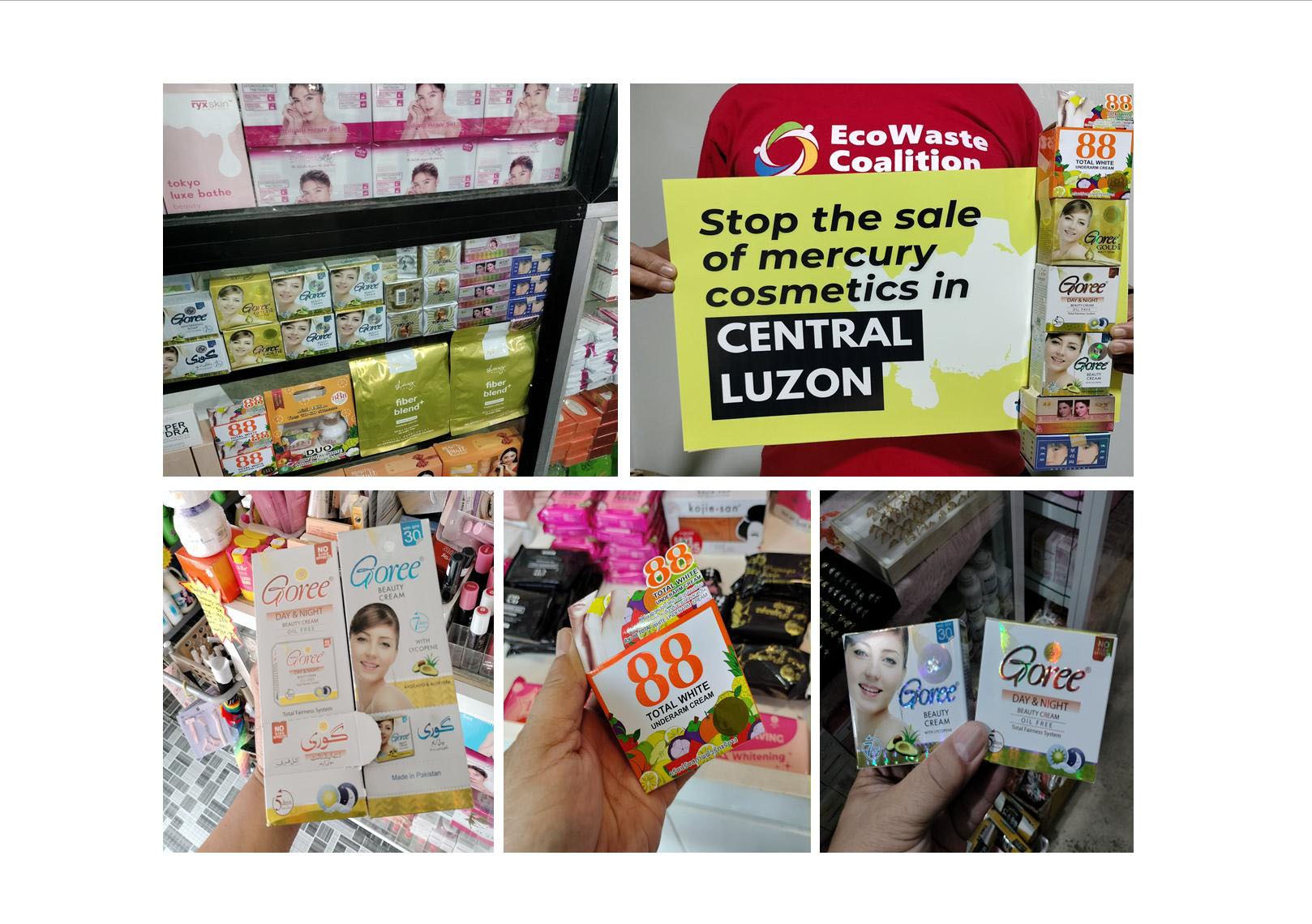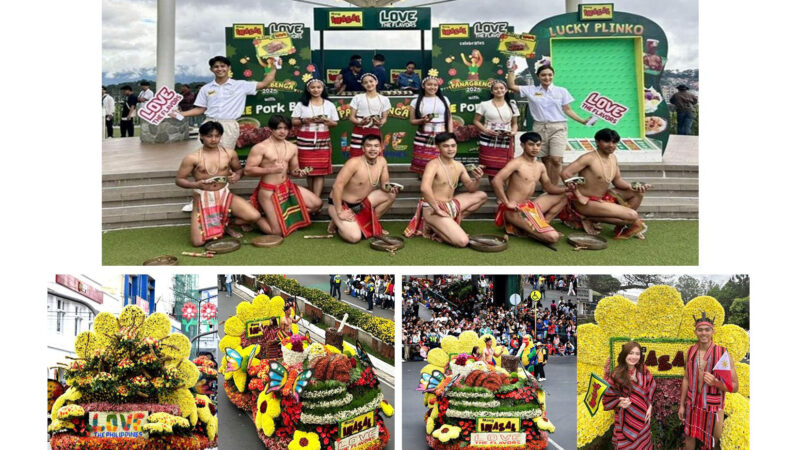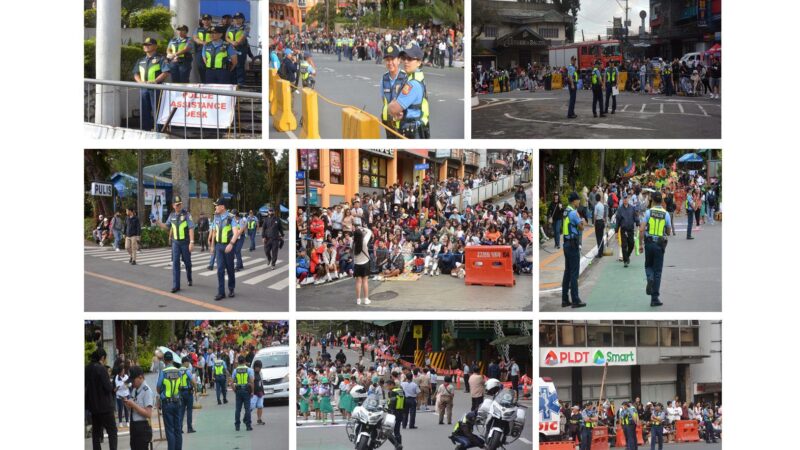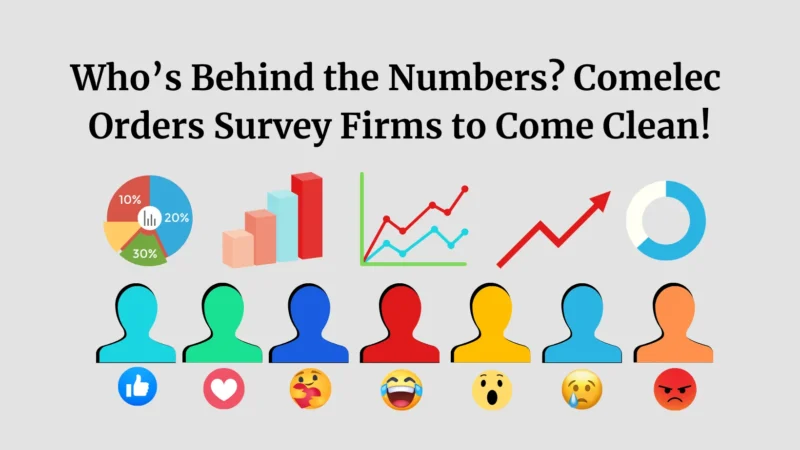EcoWaste Coalition Exposes Trade of FDA-Flagged Mercury Cosmetics in 16 Towns in Central Luzon

(Skin whiteners with mercury sold not only in big cities, but in smaller municipalities)
25 September 2024, Quezon City. Dangerous cosmetics contaminated with high levels of mercury are being sold not only in big cities of Central Luzon, but also in smaller municipalities.
The EcoWaste Coalition, an advocate for a zero waste and toxics-free society, revealed this lamentable situation following a rapid market investigation that uncovered the illegal trade of mercury-laden cosmetics in 37 stores located in 16 diverse municipalities in the provinces of Bulacan, Nueva Ecija, Pampanga and Tarlac.
The group’s past monitoring activities focused more on highly urbanized and component cities in the region where mercury cosmetics are sold, including in Baliwag, Malolos and San Jose del Monte Cities in Bulacan; Cabanatuan and Gapan Cities in Nueva Ecija; Angeles, Mabalacat and San Fernando Cities in Pampanga; and Tarlac City in Tarlac, as well as Balanga City in Bataan and Olongapo City in Zambales.
“Our investigation shows that skin lightening products that have long been prohibited by the country’s health authorities are openly sold with impunity not only in big cities, but also in the smaller municipalities we recently visited,” said Aileen Lucero, National Coordinator, EcoWaste Coalition.
“Consumers aspiring for a fairer and flawless complexion need not travel to big cities as so-called beauty creams, including those with hidden mercury additives, can be easily purchased from dealers in the poblacion, the town’s commercial and political center,” she observed.
“We fear this appalling health threat is also true in other municipalities across the country as the illicit trade of contraband cosmetics with mercury content goes uninterrupted despite the unceasing efforts by the Food and Drug Administration (FDA) to curb it with support from the civil society,” she pointed out.
Based on the monitoring it conducted from September 14 to 23, the group found the stores selling one or more skin lightening products that have been flagged by the FDA for containing high levels of mercury, an extremely toxic chemical forbidden in cosmetic products, and/or for being sold without valid certificates of product notification.
Found on store shelves are Pakistan-made Goree Beauty Cream with Lycopene and Goree Day & Night Beauty Cream that were banned in 2017 (FDA Advisory No. 2017-289) and Goree Gold 24K Beauty Cream banned in 2023 (FDA Advisory No. 2023-2392), and Thailand-made 88 Total White Underarm Cream banned in 2021 (FDA Advisory No. 2021-1187).
Aside from these four FDA-flagged creams, one store also offers China-made Jiaoli Miraculous Cream banned since 2010 (FDA Advisory No. 2010-002) and S’Zitang 10-Day Whitening & Spot Day & Night Set banned in 2015 (FDA Advisory No. 2015-025).
The errant stores are located in first to fourth class municipalities, including Balagtas (5 stores), Bocaue (1), Calumpit (1), Marilao (4), Plaridel (3) and Pulilan (1) in the province of Bulacan; Cabiao (1), Guimba (5), San Isidro (1), Santa Rosa (3) and Talugtug (1) in Nueva Ecija; Apalit (1), Arayat (4), San Simon (1) and Santa Ana (2) in the province of Pampanga; and Victoria (3) in the province of Tarlac. For example:
— A herbal drug store in Balagtas, Bulacan doubles as a cosmetic shop selling six-FDA flagged mercury cosmetics, including Jiaoli Miraculous Cream that was banned in 2010;
— A bread store in Santa Rosa, Nueva Ecija sells three types of mercury-containing Goree as a sideline;
— A dealer of Avon products in Arayat, Pampanga also sells banned Goree items; and
— A “one-stop shop for all your beauty needs” in Victoria, Tarlac has a full stock of forbidden Goree products.
The EcoWaste Coalition has notified the FDA about its findings through an e-mail sent yesterday to Engr. Ana Trinidad Rivera, head of the Center for Cosmetics and Household/Urban Hazardous Substances Regulation and Research (CCHUHSRR).
Mercury is a highly toxic chemical added to some skin whitening products to contain the body’s production of melanin making the skin appear lighter. A potent neurotoxin prohibited in cosmetics as per the ASEAN Cosmetic Directive and the Minamata Convention, mercury is released through the usual product use with skin absorption and vapor inhalation as typical routes of exposure.
As stated by the World Health Organization (WHO), “mercury-containing skin lightening products are hazardous to health.” Side effects of using such tainted items include skin discoloration, rashes and scarring, and lower skin’s resistance to bacterial and fungal infections. Repeated applications can harm the kidneys, the brain and the central nervous system, noting that mercury can cross the placental barrier during pregnancy and get passed to nursing babies through the breast milk, affecting the child’s developing brain and nervous system and causing neuro-developmental problems.
To safeguard consumers and even non-users like children and fetuses against mercury exposure, the EcoWaste Coalition is pushing for strengthened strategy and action involving all sectors to stop the illicit trade of mercury cosmetics. Last August 2024, the group wrote to the FDA to propose a multi-stakeholder summit to discuss and agree on solutions to this persistent threat to public health and the environment.
Finally, the EcoWaste Coalition reminded Filipinos “there is beauty and dignity in our natural skin color, so refrain from using skin bleaching, lightening or whitening products, particularly contraband cosmetics (which are) not guaranteed safe from mercury, hydroquinone and other harmful substances.” (PR)
Reference:
https://www.fda.gov.ph/wp-content/uploads/2022/05/FDA-Advisory-No.-2017-289.pdf
https://www.fda.gov.ph/wp-content/uploads/2021/06/FDA-Advisory-No.2021-1187.pdf
https://www.fda.gov.ph/wp-content/uploads/2023/12/FDA-Advisory-No.2023-2392.pdf
https://www.fda.gov.ph/wp-content/uploads/2022/05/FDA-Advisory-No.-2015-025.pdf
https://www.who.int/publications/i/item/WHO-CED-PHE-EPE-19.13







